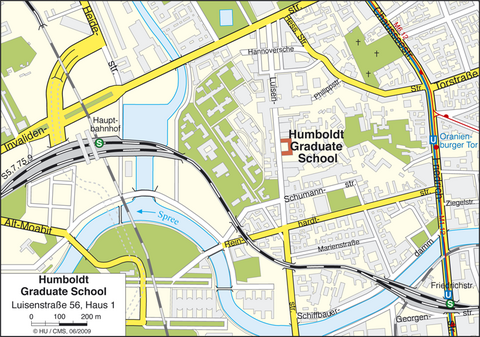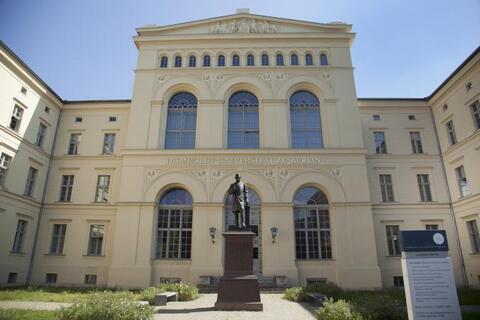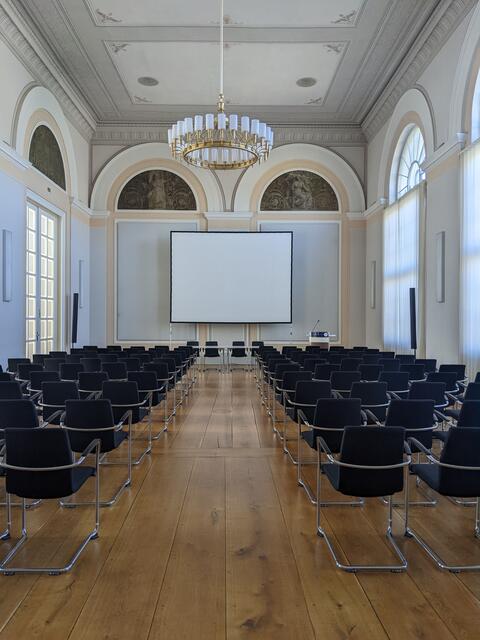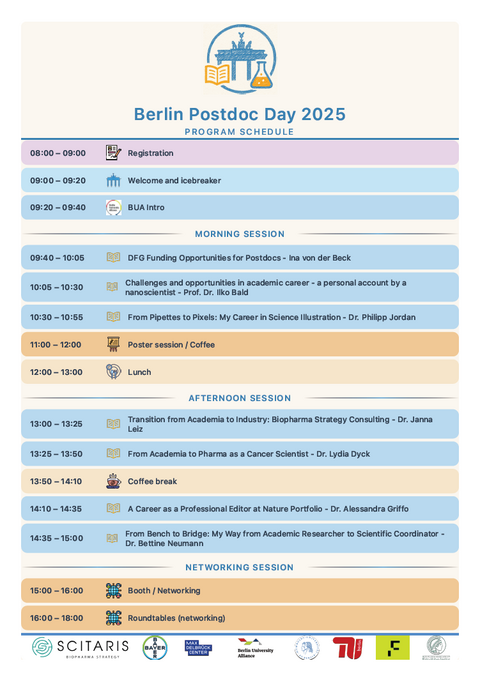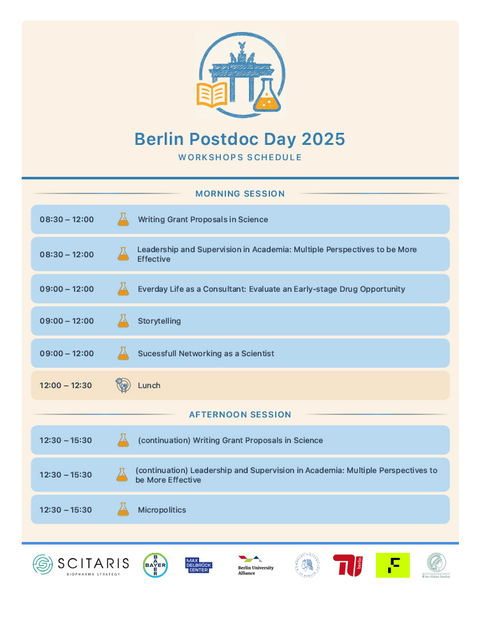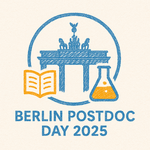
Berlin PostDoc Day
November 6th and 7th, 2025 – Humboldt Graduate School, Berlin
Home
The Berlin PostDoc Day 2025 (#PDD25) is an annual event organized by an enthusiastic team of Berlin-based PostDocs from diverse institutions, including MDC, FMP, FHI, Charité, and BAM. Join us in person at the beautiful Humboldt Graduate School!
Register now for PDD25 here!
We are excited to announce that this year's Berlin PostDoc Day (#PDD25) will take place on November 6–7, 2025, as part of the Berlin Science Week. The event is open to all PostDocs and final-year PhD students from every discipline across Berlin.
Stay connected and informed—subscribe for updates via email, LinkedIn, or Bluesky, and share your enthusiasm on social media!
Take a look at this video from one of our previous PostDoc Day events to see what's in store:
Share Your Research—Explore New Horizons
Check out our PDD25 preliminary program.
Over the years, PostDoc Day has successfully gathered researchers from diverse fields, offering fantastic networking opportunities and a platform to showcase your work. Submit your abstract and compete for the “Best Poster” Award!
This year’s agenda includes selected scientific presentations in the morning, followed by engaging sessions focused on various career pathways and skill-building workshops. Enhance your career prospects, make informed decisions about your future, and expand your professional network. You might just find new friends and collaborators along the way!
Come join, get inspired, and make lasting connections!
Our Sponsors
Scitaris | Bayer | Max Delbrück Center | BUA | TU | FU | HU | Fritz-Haber Institut | Leibniz-Forschungsinstitut für Molekulare Pharmakologie (FMP)
Venue
The Berlin Postdoc Day 2025 will be held at:
Humboldt Graduate School
Luisenstraße 56, 10117 Berlin
Enjoy the inspiring atmosphere of the historic Humboldt Graduate School building!
We look forward to welcoming you at #PDD25!
Program
Workshops
The following workshops will be offered as part of the Berlin PostDoc Day 2025:
- Workshop: Writing Grant Proposals in Science (Coach: Annette Kolb)*
Securing external funding is a key part of a successful research career. This workshop equips postdoctoral researchers with the knowledge and practical tools needed to design, structure, and write strong grant proposals. Participants will gain insight into the fundraising process in science, explore major funding opportunities in Germany and the EU, and learn how to write from the reviewer’s point of view.
The course combines theoretical input with hands-on individual and group exercises to help participants develop their own funding strategies and proposal drafts.
Topics include:
- The fundraising process in science
- Funding landscape in Germany and the EU
- Understanding the reviewer’s perspective
- Structure and logic of a strong proposal
- Strategic writing: clarity, structure, and style
- Planning your next steps
Language: English
Target Group: Postdocs (max. 16 participants)*This workshop is a full-day workshop from 8:30 to 15:30.
- Leadership & Supervision in Academia: Multiple Perspectives to Be More Effective (Coach: Prof. Matteo Garavoglia)*
Target Group:
Doctoral candidates, postdocs, and early-career academic team leaders.Overview:
This interactive workshop helps participants enhance their leadership and supervision skills in academic settings. It explores the dynamics of teamwork, effective supervision strategies, and how to adapt leadership styles to different team needs. Emphasis is placed on intercultural awareness, diversity, and self-reflection to foster productive and inclusive research environments.Format:
The program combines theory and practice through role-plays, real-life simulations, and group discussions. On the second day, participants receive individual, tailor-made one-to-one coaching sessions.Key Topics:
- Team dynamics and intercultural communication
- Leadership styles and strategies
- Common leadership pitfalls and solutions
- Self-awareness and personal leadership profiles
Trainer:
Prof. Matteo Garavoglia (Tsinghua University & University of Oxford) — an experienced international trainer specializing in leadership, communication, and academic development.*This workshop is a full-day workshop from 8:30 to 15:30.
- Successful Networking for Scientists (Coach: Thomas Knappe)
Target Group:
Postdoctoral researchers (max. 12 participants)Overview:
Networking is a crucial skill for advancing in academia. This interactive workshop helps researchers understand how to build and maintain meaningful professional connections that foster collaboration, knowledge exchange, and career growth. Participants will learn how to set clear networking goals, identify valuable contacts, and communicate effectively to sustain productive relationships.Key Topics:
- The importance and purpose of networking in science
- Defining personal networking goals and strategies
- Assessing and strengthening your current network
- Identifying and approaching key contacts
- Balancing giving and receiving in professional relationships
- Online and in-person networking techniques
Format & Methods:
A mix of trainer input, group and pair exercises, reflection, and experience sharing. The workshop integrates systemic methods and Neuro-Semantics tools to develop a personal networking strategy. A short preparatory task will be sent to participants before the session.Trainer:
Thomas KnappeLanguage:
EnglishFrom 9:00 to 12:00
- Story telling (Coaches: Katharina Rosin)
This workshop is designed for postdocs who aspire to make their research impactful and memorable, even to audiences outside the scientific community. Participants will you will get to know the key elements of the storytelling method and put them into practice to convey their own scientific ideas. The workshop will cover the basics of storytelling and various storytelling frameworks as well as how to create the protagonist of their research story. Participants will learn to define the intended impact of their story and master captivating storytelling techniques. The workshop includes practical exercises and peer feedback, helping participants refine their storytelling skills to effectively communicate their scientific ideas.
From 9:00 to 12:00
- Everyday Life as a Consultant: Evaluate an Early-Stage Drug Opportunity (Coach: )
Target Group:
Postdocs and early-career scientistsOverview:
Get a hands-on insight into consulting in the life sciences. Learn how to evaluate early-stage drug opportunities by balancing scientific, strategic, and commercial aspects.Key Content:
- Consulting in life sciences: roles and tasks
- Criteria for assessing early-stage drugs
- Case-based group exercises and discussions
Language:
EnglishFrom 9:00 to 12:00
- Micropolitics in Academia (Coach: Anke Kautz)
Target Group:
Researchers and staff working in academic or research managementOverview:
Scientists and research managers often navigate complex hierarchies, informal power dynamics, and unclear responsibilities. This interactive workshop introduces participants to micropolitical dynamics and negotiation strategies, helping them confidently handle challenging situations within both formal and informal structures. Special emphasis is placed on diversity and inclusive decision-making.Key Topics:
- Understanding formal and informal power structures in academia
- Identifying micropolitical dynamics and challenges
- Negotiation tools and strategies for complex situations
- Approaches to manage diversity in academic settings
Format & Methods:
Interactive exercises, case discussions, and strategy development to apply insights to real-world scenarios.Trainer:
Anke KautzLanguage:
EnglishFrom 12:30 to 15:30
Contact Us
If you have questions or suggestions, feel free to reach out to the organizing committee:
Organizing Committee:
- Basma Altattan – basmaaltattan@outlook.com
- Tejas Iyer – tejas.iyer@wias-berlin.de
- Ridhima Das – das.ridhima@outlook.com
- Hemanth Pillai – pillai.hemanth@gmail.com
- Amr Mostafa – amr.shaffei@gmail.com
- Daniel Mutithu – daniel.mutithu@bih-charite.de
Venue generously sponsored by:
Humboldt-Universität zu Berlin
News and Updates
Sponsor Us
The Berlin PostDoc Day highlights innovative research conducted by postdoctoral fellows across Berlin, fosters interdisciplinary collaboration, and supports career development.
Every year, the event attracts approximately 150 postdoctoral researchers from diverse scientific backgrounds and engages all major universities and research institutions in the Berlin area—one of Europe's largest hubs for scientific research.
We invite industry partners to join us in this unique opportunity to connect directly with brilliant, motivated postdocs—key players in innovation, research, and scientific breakthroughs.
We offer various sponsorship packages and are happy to tailor personalized solutions to meet your needs.
Interested in becoming a sponsor for Berlin PostDoc Day 2025?
Please contact:
Amr Mostafa – amr.shaffei@gmail.com
Current Sponsors
Scitaris | Bayer | Max Delbrück Center | BUA | TU | FU | HU | Fritz-Haber Institut | Leibniz-Forschungsinstitut für Molekulare Pharmakologie (FMP)

